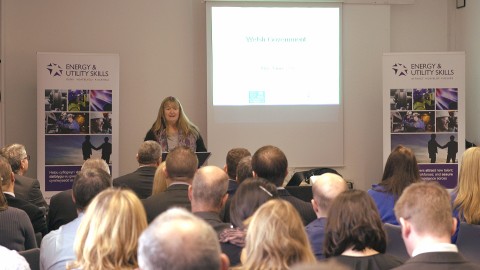Published on: December 8, 2014 at 3:49 PM
The Institute was created by Energy & Utility Skills (EU Skills) – the employer-led organisation responsible for benchmarking skills and standards and offering recruitment solutions in the sector – and is led by the National Skills Academy for Power (NSAP). The Institute’s key achievements in its first twelve months include boosting training provision, mapping the growth potential of the sector in Wales and creating new demand for the wind power sector.
To date, the project has received a total of £395,350 through the EU-funded Sector Priorities Fund, through the Welsh Government.
The Institute plans to continue boosting the Welsh economy in 2015, whilst further tackling the skills gap in the renewables sector.
Announcing the Institute’s achievements at the National Assembly for Wales, Julie James, Deputy Minister for Skills and Technology, said:
“I’m delighted that this project has identified a need for new training programmes to prepare the Welsh workforce to meet the demands of this changing and developing sector.
“The resulting work has made a valuable contribution to the Welsh Government’s commitment to sustainable skills and to an environment where businesses can invest with confidence. This success will contribute to putting Wales at the forefront of green growth.”
Neil Robertson, Chief Executive of EU Skills, said:
“Thanks to both the Welsh Government and European Social Fund’s support, The Institute has become a fantastic example of the quick progress that can be made in developing energy and utility workforces. It has delivered unique market insight, boosted recruitment and training, and most importantly of all, catalysed greater collaboration throughout the sector. We believe the UK can develop a fully sustainable renewables sector and the Institute is making a vital contribution to achieving this target.
“We look forward to sharing the learnings from the project with our organisation’s membership around the UK.”
The Institute supports the government target of achieving 15 per cent of energy from renewable sources by 2020. Wind and marine power will play a key role in reaching this target and filling the estimated 70,000 roles directly in, or related to, the renewables sector.
The Institute aims to become a centre of excellence that develops workforce skills in the installation, commissioning and operation of energy generation sites, such as wind farms and tidal power generation sources. Improving the distribution of energy to customers will also be a key focus, with the overall objective of helping the sector meet its overall current and future skills needs.
